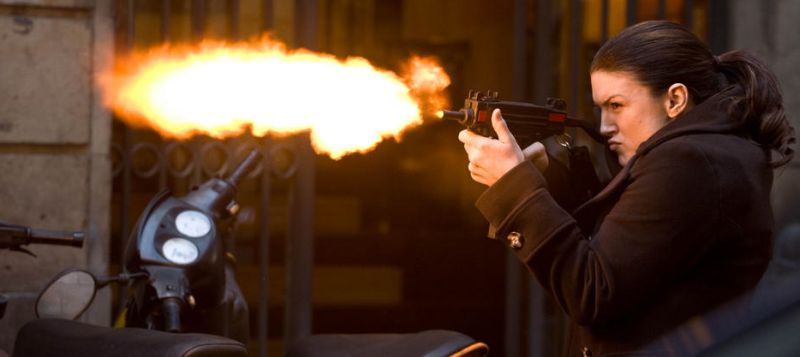 ★★★★½
★★★★½
“First Form at Mallory Towers”
 Soderbergh has never shied away from using unconventional cast members in his movies. Bubble was made entirely with non-professional actors, and when he wanted someone to play a high-class call-girl for The Girlfriend Experience, he went with renowned adult actress, Sasha Grey. Continuing this trend, Haywire revolves around MMA star Carano, which I guess means Soderbergh’s recent leading ladies could, in real life, kick your ass or lick your ass. Ok, I’ll stop. Here, Carano plays Mallory Kane – I keep wanting to type Mallory Knox – an employee of a shady private contracting firm with links to the government, who do the dirty jobs for which the feds want plausible deniability.
Soderbergh has never shied away from using unconventional cast members in his movies. Bubble was made entirely with non-professional actors, and when he wanted someone to play a high-class call-girl for The Girlfriend Experience, he went with renowned adult actress, Sasha Grey. Continuing this trend, Haywire revolves around MMA star Carano, which I guess means Soderbergh’s recent leading ladies could, in real life, kick your ass or lick your ass. Ok, I’ll stop. Here, Carano plays Mallory Kane – I keep wanting to type Mallory Knox – an employee of a shady private contracting firm with links to the government, who do the dirty jobs for which the feds want plausible deniability.
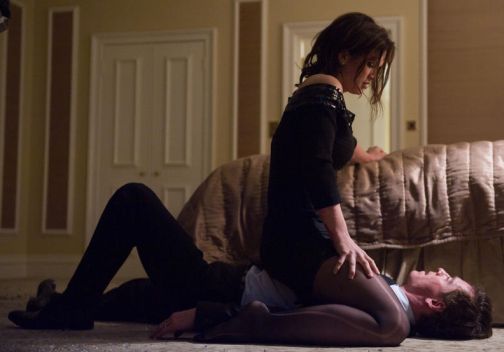 We first meet her in a diner, where Aaron (Tatum) meets her. It’s clear there’s some tension, with Aaron having been ordered to bring her in. After a brief, brutal brawl, she knocks him out and escapes, in a car belonging to startled patron Scott (Angarano). There she reveals what led up to that day: an operation in Barcelona, supposedly to rescue a hostage, followed by another in Dublin, which turned out to be an attempt to tidy up the loose ends from Barcelona, The plan is to frame Kane for multiple murders and portray her as a rogue operative. Kane needs to get to her boss, Kenneth (McGregor), and expose the truth before she’s gunned down.
We first meet her in a diner, where Aaron (Tatum) meets her. It’s clear there’s some tension, with Aaron having been ordered to bring her in. After a brief, brutal brawl, she knocks him out and escapes, in a car belonging to startled patron Scott (Angarano). There she reveals what led up to that day: an operation in Barcelona, supposedly to rescue a hostage, followed by another in Dublin, which turned out to be an attempt to tidy up the loose ends from Barcelona, The plan is to frame Kane for multiple murders and portray her as a rogue operative. Kane needs to get to her boss, Kenneth (McGregor), and expose the truth before she’s gunned down.
It’s a deliberately-vague plot, with the characters speaking in clipped obscurisms, that leave the audience to piece things together. Don’t worry, it all becomes clear by the end, but it is probably fair to say that you have to pay a bit more attention than is usual for this kind of Hollywood thriller, between the fractured timeline and doubtful loyalties of most characters. It’s economical, at a tight 91 minutes (about 22 minutes shorter than the average Jason Bourne movie to date), and much like Carano, there’s not much fat on its bones: every scene serves a distinct purpose, which is definitely the way I like my movies.
I find it hard to criticize Carano’s acting, because it’s not clear how much acting is involved. Mallory Kane does not just possess physical prowess, but one who is also extremely comfortable with using it, and has a quiet confidence in her abilities. Any similarity to Carano is clearly not coincidental, and there isn’t much more required of her, in terms of emotion or depth. Unlike most action heroines there is no “personal” agenda e.g. Sarah Connor in T2, Ellen Ripley in Aliens, or The Bride in Kill Bill, it’s simply a case that her enemies are out to get her. In that aspect, Knox is not a particularly-“feminine” character. Just as Salt was originally envisaged as a male role, it’s easy to imagine someone like Jason Statham playing this part; hardly any plot changes would be needed.
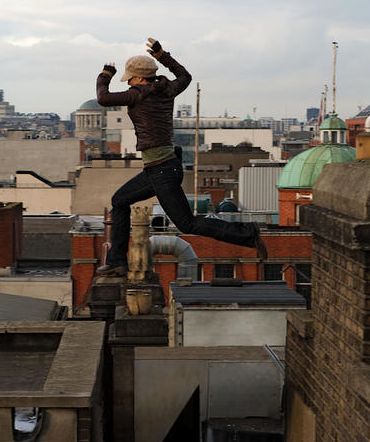 And then there’s the ass-kicking, of various kinds. It’s good, Carano demonstrating a no-nonsense style that’s highly-effective. Perhaps too effective, in fact, since it seems that hardly any of the fights last longer than about 30 seconds – even the hotel bedroom one, which is certainly one of the roughest male/female brawls seen this side of Terminator 3, feels like it ends, just about when it should be getting going. While it’s nice to be left wanting more, rather than less, it’s still not quite the all-you-can-eat buffet of action I wanted. There also is no real sense of escalation; her final battle isn’t particularly different from the one which opens the film, in the diner; it has another location, and that’s about it, there’s no indication her adversary is any more of a challenge.
And then there’s the ass-kicking, of various kinds. It’s good, Carano demonstrating a no-nonsense style that’s highly-effective. Perhaps too effective, in fact, since it seems that hardly any of the fights last longer than about 30 seconds – even the hotel bedroom one, which is certainly one of the roughest male/female brawls seen this side of Terminator 3, feels like it ends, just about when it should be getting going. While it’s nice to be left wanting more, rather than less, it’s still not quite the all-you-can-eat buffet of action I wanted. There also is no real sense of escalation; her final battle isn’t particularly different from the one which opens the film, in the diner; it has another location, and that’s about it, there’s no indication her adversary is any more of a challenge.
While the battles are well crafted – I note that the fight co-ordinator was J.J. Perry, who worked on Sunland Heat back in 2005 – perhaps my favorite scene was not actually one of them, but an extended scene where Mallory has to shake off her pursuers in Dublin. It is adequately extended, contains a number of twists and turns over its length, and showcases Carano’s physical prowess in more than just brutality, as she glides through and over buildings. I also enjoyed a snowy car-chase, which ends in a way which, I’m prepared to bet, you haven’t seen in a movie before. One senses Soderbergh and writer Lem Dobbs enjoyed playing with the usual expectations of the genre.
It’s certainly shot in typical Soderbergh style. He throws all manner of styles in there, from black-and-white through hand-held to the heavy use of colour filters. Mostly, these flourishes enhance the film, rather than distracting from it, and a billion nods of approval are due for avoiding the rapid-cut style of editing, which is the bane of modern action cinema (except for the rare cases where it’s done properly). Still, there’s no question it’s obvious who made it, to the point that I actually laughed when a shot of Kenneth appeared in sepia – having seen Traffic, I knew, before it was explained, that he had to be in Mexico.
All told, if not quite an all-time classic, this is more than acceptable, upper-tier work. Carano is by no means out of her depth, despite a heavyweight supporting cast including the likes of Michael Douglas and Antonio Banderas, and has an understated charisma which works in her favour. I don’t know if her future plans involving returning to the octagon, or sticking with the acting, but if it’s the latter, she’d certainly be a welcome addition to the (fairly short) roster of credible action-heroines from which Hollywood can draw.
Dir: Steven Soderbergh
Star: Gina Carano, Ewan McGregor, Channing Tatum, Michael Angarano
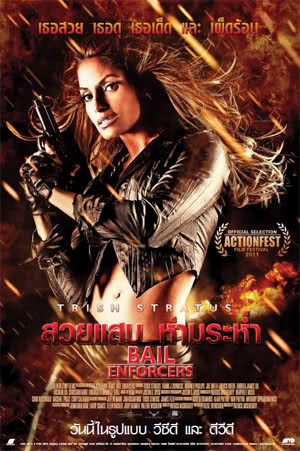 The films put out starring WWE wrestlers are a bit of a mixed bag: some are mindlessly entertaining, while others are near unwatchable. And much the same goes for their Diva’s division: some are actually good wrestlers, others are clearly chosen for their looks. Stratus does probably fall into the former category, but this doesn’t do her adequate justice, and top-billing is probably a bit of a stretch – she’s held hostage more than she kicks ass. She plays Jules, one of three bounty-hunters, who pick up a guy that suggests a deal: let him go, and he’ll point them to a wanted man with a $100,000 reward. They accept, but when taking the guy in, get a call from mob boss Hal Lambino (Rafla) who offers them one million dollars if they deliver the bail-jumper to him instead. Needless to say, the transaction doesn’t go smoothly.
The films put out starring WWE wrestlers are a bit of a mixed bag: some are mindlessly entertaining, while others are near unwatchable. And much the same goes for their Diva’s division: some are actually good wrestlers, others are clearly chosen for their looks. Stratus does probably fall into the former category, but this doesn’t do her adequate justice, and top-billing is probably a bit of a stretch – she’s held hostage more than she kicks ass. She plays Jules, one of three bounty-hunters, who pick up a guy that suggests a deal: let him go, and he’ll point them to a wanted man with a $100,000 reward. They accept, but when taking the guy in, get a call from mob boss Hal Lambino (Rafla) who offers them one million dollars if they deliver the bail-jumper to him instead. Needless to say, the transaction doesn’t go smoothly.




 I could hear Chris’s eyes rolling when the title came up – I can’t blame her, as the viewing immediately followed Virgin Commandos, whose mere name sent her scurrying off to Facebook poker. This, however, was not the soft-porn flick she anticipated. Instead, it’s a comedy, somewhat spoofing Gladiator, but its closest cousin is likely Carry On Cleo. That said, it’s undeniably gynocentric, with the three heroines about the only competent characters on either side.
I could hear Chris’s eyes rolling when the title came up – I can’t blame her, as the viewing immediately followed Virgin Commandos, whose mere name sent her scurrying off to Facebook poker. This, however, was not the soft-porn flick she anticipated. Instead, it’s a comedy, somewhat spoofing Gladiator, but its closest cousin is likely Carry On Cleo. That said, it’s undeniably gynocentric, with the three heroines about the only competent characters on either side.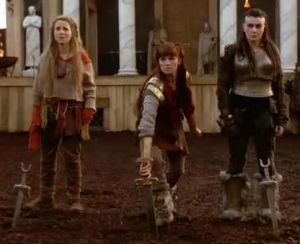 The action is undeniably limited, being played more for laughs than excitement – the much-fabled ‘Celtic Kick’, turns out to be not quite what you think. Of course, this being British humour, there are also fart and willie jokes, but works because the characters have foibles and quirks to render them human. Smirgut has lost her inner warrior since motherhood; Dwyfuc is thoroughly unimpressed by the men available to her, and Worthaboutapig has long-standing self-esteem issues – unsurprisingly, really, given her name. The results are heroines who are likeable, as well as being brave and resourceful. I found the results very refreshing, with better-drawn characters than many bigger budget movies. That was definitely
The action is undeniably limited, being played more for laughs than excitement – the much-fabled ‘Celtic Kick’, turns out to be not quite what you think. Of course, this being British humour, there are also fart and willie jokes, but works because the characters have foibles and quirks to render them human. Smirgut has lost her inner warrior since motherhood; Dwyfuc is thoroughly unimpressed by the men available to her, and Worthaboutapig has long-standing self-esteem issues – unsurprisingly, really, given her name. The results are heroines who are likeable, as well as being brave and resourceful. I found the results very refreshing, with better-drawn characters than many bigger budget movies. That was definitely  ★★★★½
★★★★½ Soderbergh has never shied away from using unconventional cast members in his movies. Bubble was made entirely with non-professional actors, and when he wanted someone to play a high-class call-girl for The Girlfriend Experience, he went with renowned adult actress, Sasha Grey. Continuing this trend, Haywire revolves around MMA star Carano, which I guess means Soderbergh’s recent leading ladies could, in real life, kick your ass or lick your ass. Ok, I’ll stop. Here, Carano plays Mallory Kane – I keep wanting to type Mallory Knox – an employee of a shady private contracting firm with links to the government, who do the dirty jobs for which the feds want plausible deniability.
Soderbergh has never shied away from using unconventional cast members in his movies. Bubble was made entirely with non-professional actors, and when he wanted someone to play a high-class call-girl for The Girlfriend Experience, he went with renowned adult actress, Sasha Grey. Continuing this trend, Haywire revolves around MMA star Carano, which I guess means Soderbergh’s recent leading ladies could, in real life, kick your ass or lick your ass. Ok, I’ll stop. Here, Carano plays Mallory Kane – I keep wanting to type Mallory Knox – an employee of a shady private contracting firm with links to the government, who do the dirty jobs for which the feds want plausible deniability. We first meet her in a diner, where Aaron (Tatum) meets her. It’s clear there’s some tension, with Aaron having been ordered to bring her in. After a brief, brutal brawl, she knocks him out and escapes, in a car belonging to startled patron Scott (Angarano). There she reveals what led up to that day: an operation in Barcelona, supposedly to rescue a hostage, followed by another in Dublin, which turned out to be an attempt to tidy up the loose ends from Barcelona, The plan is to frame Kane for multiple murders and portray her as a rogue operative. Kane needs to get to her boss, Kenneth (McGregor), and expose the truth before she’s gunned down.
We first meet her in a diner, where Aaron (Tatum) meets her. It’s clear there’s some tension, with Aaron having been ordered to bring her in. After a brief, brutal brawl, she knocks him out and escapes, in a car belonging to startled patron Scott (Angarano). There she reveals what led up to that day: an operation in Barcelona, supposedly to rescue a hostage, followed by another in Dublin, which turned out to be an attempt to tidy up the loose ends from Barcelona, The plan is to frame Kane for multiple murders and portray her as a rogue operative. Kane needs to get to her boss, Kenneth (McGregor), and expose the truth before she’s gunned down. And then there’s the ass-kicking, of various kinds. It’s good, Carano demonstrating a no-nonsense style that’s highly-effective. Perhaps
And then there’s the ass-kicking, of various kinds. It’s good, Carano demonstrating a no-nonsense style that’s highly-effective. Perhaps 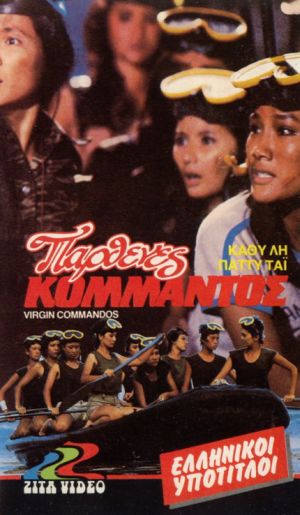 This came out the same year as Golden Queens Commando and Pink Force Commando and feels like a Taiwanese knock-off, taking a similarly bulk approach to its action heroines. They escape from (what I discovered lately was) a North Vietnamese prison, with the help of the warden, who is in love with one of his captives – he comes along too, and they all end up on an island where there’s a guerilla force, run by the Captain, whom we’ll get back to later. They become part of her “Ladies Marine Corps”, and start to train. One of the girls’ mothers shows up, offering to take her back to Hong Kong, but the farewell party is interrupted by pirates, who kill the mother. Two of the platoon desert. Finally – and we’re talking an hour into a movie that runs only 85 minutes – the training is over, and the Slightly-Irritated Frogwomen (movie titler, please note) head off on their first mission, to recover a cache of diamonds hidden on a North Vietnamese boat.
This came out the same year as Golden Queens Commando and Pink Force Commando and feels like a Taiwanese knock-off, taking a similarly bulk approach to its action heroines. They escape from (what I discovered lately was) a North Vietnamese prison, with the help of the warden, who is in love with one of his captives – he comes along too, and they all end up on an island where there’s a guerilla force, run by the Captain, whom we’ll get back to later. They become part of her “Ladies Marine Corps”, and start to train. One of the girls’ mothers shows up, offering to take her back to Hong Kong, but the farewell party is interrupted by pirates, who kill the mother. Two of the platoon desert. Finally – and we’re talking an hour into a movie that runs only 85 minutes – the training is over, and the Slightly-Irritated Frogwomen (movie titler, please note) head off on their first mission, to recover a cache of diamonds hidden on a North Vietnamese boat.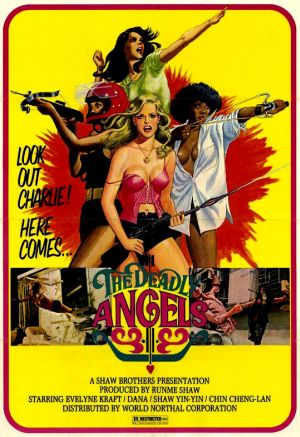 Inspired though the alternate titling of The Bod Squad might be, the original title likely gives a better idea of the inspiration for this 1977 Shaw Brothers flick: think Charlie’s rather than deadly. Three women, from Korea, Hong Kong and Japan, under the orders of
Inspired though the alternate titling of The Bod Squad might be, the original title likely gives a better idea of the inspiration for this 1977 Shaw Brothers flick: think Charlie’s rather than deadly. Three women, from Korea, Hong Kong and Japan, under the orders of  While the title suggests something inspired by Corman’s Big Bad Mama, this is a contemporary tale which, in some ways, is actually closer to Faster Pussycat. It has a great deal more nudity, right from the opening scene in which Becky (Rialson) stares into a mirror, and puts on her bikini-top… very… slowly… However, the titular Mama (Grahame) is nowhere near the level of Varla, and the movie feels more like a pale imitation, despite the additional breasts.
While the title suggests something inspired by Corman’s Big Bad Mama, this is a contemporary tale which, in some ways, is actually closer to Faster Pussycat. It has a great deal more nudity, right from the opening scene in which Becky (Rialson) stares into a mirror, and puts on her bikini-top… very… slowly… However, the titular Mama (Grahame) is nowhere near the level of Varla, and the movie feels more like a pale imitation, despite the additional breasts. A series of bank raids has local police baffled: ‘The Executives’ specialize in slick, swift in and outs, never over-reaching themselves. They’re also very well-dressed, which might actually be a clue, since these four robbers are women, under veteran criminal Fox (Evans). But all is not well in this gang of thieves, with some seeking a bigger score. Matters come to a head when they find a cop (Lombardi) nosing around their headquarters, and a tracking device attached to their van – all signs point to an informant within the gang, Is someone seeking to take over from Fox? Or is Fox herself tired of her accomplices? Let the accusations – and the bullets – fly.
A series of bank raids has local police baffled: ‘The Executives’ specialize in slick, swift in and outs, never over-reaching themselves. They’re also very well-dressed, which might actually be a clue, since these four robbers are women, under veteran criminal Fox (Evans). But all is not well in this gang of thieves, with some seeking a bigger score. Matters come to a head when they find a cop (Lombardi) nosing around their headquarters, and a tracking device attached to their van – all signs point to an informant within the gang, Is someone seeking to take over from Fox? Or is Fox herself tired of her accomplices? Let the accusations – and the bullets – fly. All told, however, these are small quibbles, and the bottom line is: we enjoyed it. Someone should give Blinky enough money for a proper movie – but I suspect, Notarile will likely keep on making films, whether anyone does or not! I’ll be looking out for them.
All told, however, these are small quibbles, and the bottom line is: we enjoyed it. Someone should give Blinky enough money for a proper movie – but I suspect, Notarile will likely keep on making films, whether anyone does or not! I’ll be looking out for them.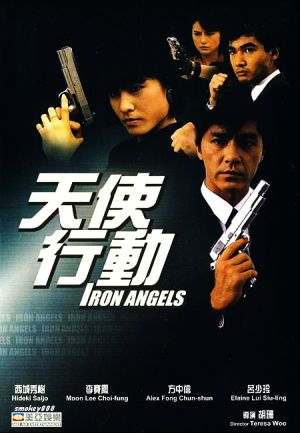 This and Yes, Madam were basically the Genesis and Exodus of the genre as we know it. Sure, there had been action heroines before, but never with quite the heft of their male counterparts. Madam showed they could kick ass with the best of them; Angel took this, and added about a billion bullets to the mix. Sure, it’s rough around the edges, with scenes that appear randomly inserted and characters so shallow they resemble a puddle. But its influence was massive, and if you can watch the final battle without wincing, as Lee and Oshima kick the utter crap out of each other, you’re made of tougher stuff than I [It’s the December 2011 video of the month].
This and Yes, Madam were basically the Genesis and Exodus of the genre as we know it. Sure, there had been action heroines before, but never with quite the heft of their male counterparts. Madam showed they could kick ass with the best of them; Angel took this, and added about a billion bullets to the mix. Sure, it’s rough around the edges, with scenes that appear randomly inserted and characters so shallow they resemble a puddle. But its influence was massive, and if you can watch the final battle without wincing, as Lee and Oshima kick the utter crap out of each other, you’re made of tougher stuff than I [It’s the December 2011 video of the month]. This was my first true vintage “pinky violence” movie, though I had bumped against some fringe entries in the genre before e.g. Female Convict Scorpion: Jailhouse 41, which I enjoyed and really must get round to reviewing for here some time. This one…not so much. It focuses on Rika (Oshida), who gets out of reform school, and gets a job as a ‘companion’ at a bar, where most of the girls have a similarly troubled background. The local Yakuza boss is sniffing around, and his path crosses Rika’s after she (semi-unwittingly) helps a colleague steal some drugs from them. As a result, the house mother/bar owner, is on the hook for three million yen, plus interest.
This was my first true vintage “pinky violence” movie, though I had bumped against some fringe entries in the genre before e.g. Female Convict Scorpion: Jailhouse 41, which I enjoyed and really must get round to reviewing for here some time. This one…not so much. It focuses on Rika (Oshida), who gets out of reform school, and gets a job as a ‘companion’ at a bar, where most of the girls have a similarly troubled background. The local Yakuza boss is sniffing around, and his path crosses Rika’s after she (semi-unwittingly) helps a colleague steal some drugs from them. As a result, the house mother/bar owner, is on the hook for three million yen, plus interest. And winner of ‘Least Accurate Movie Tag-line of 2011’ goes to this one, by a country mile. “Sucker Punch on steroids”? Well, let me tell you something. I know Sucker Punch. And Warriors, you’re no Sucker Punch. The drugs reference is fitting, though I’m thinking less steroids, and more likely an overdose of Vicodin. Everything about this, from martial-arts fights staged at the speed of a reluctant glacier, through lighting of scenes that’s so poor as often to be non-existent and obvious digital gunfire [as seen in an extended scrap-yard gun-battle, without any glass being shattered at all], to a painful, sludgecore metal soundtrack presumably made by some mate of the producers, combine into a deeply uninteresting viewing experience.
And winner of ‘Least Accurate Movie Tag-line of 2011’ goes to this one, by a country mile. “Sucker Punch on steroids”? Well, let me tell you something. I know Sucker Punch. And Warriors, you’re no Sucker Punch. The drugs reference is fitting, though I’m thinking less steroids, and more likely an overdose of Vicodin. Everything about this, from martial-arts fights staged at the speed of a reluctant glacier, through lighting of scenes that’s so poor as often to be non-existent and obvious digital gunfire [as seen in an extended scrap-yard gun-battle, without any glass being shattered at all], to a painful, sludgecore metal soundtrack presumably made by some mate of the producers, combine into a deeply uninteresting viewing experience.